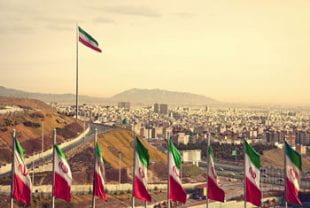EXPERT ALERT
Jeff Falk
713-348-6775
jfalk@rice.edu
US interests would be ‘deeply undermined’ by a war with Iran, Baker Institute expert says
HOUSTON — (June 17, 2019) – As tensions between the United States and Iran rise, an expert at Rice University’s Baker Institute for Public Policy is warning that U.S. interests would be “deeply undermined” by a war with the Persian Gulf country.

A row of Iranian flags against the backdrop of the Tehran skyline. Credit: 123RF.com/Rice University
“Even a cursory appraisal of the handy list drawn up by the Commission on U.S. National Interests demonstrates how far off course the Trump administration’s extreme hostility toward Iran is, in terms of American interests,” Jim Krane, the Wallace S. Wilson Fellow for Energy Studies, writes in a new Forbes op-ed today. Krane is available to discuss the oil and gas-related implications with the news media.
“Trump’s re-imposition of sanctions – despite Iran’s compliance – was a major strategic blunder,” wrote Krane, the author of “Energy Kingdoms: Oil and Political Survival in the Persian Gulf.” “It reinvigorated Iranian hardliners, who now have evidence that Washington can only be counted on for one thing: betrayal.”
Krane said U.S. interests in global trade stability and energy exports would be undermined by an armed conflict.
“Iran is a major oil exporter that Trump’s unilateral embargo has taken nearly offline,” Krane wrote.
“While oil markets remain adequately supplied at the moment, a closure of the Strait of Hormuz would not go down well,” he wrote. “Some 17 million barrels of oil per day flow out the strait, a pinch point between Iran and Oman. The loss of that oil would devastate the global economy.”
Closing the strait was one of the issues that Krane examined as a participant in a 2015 oil disruption workshop convened by the U.S. Department of Energy. A special issue of the journal Energy Policy is dedicated to their findings.
“We gauged that a full closure of the strait for at least a month – long enough to exhaust some oil stored in strategic reserves – was unlikely, even in war,” Krane wrote.
“More likely, an interstate war in the Gulf would leave the Strait of Hormuz partially shut,” he wrote. It would halt at least 4 million barrels per day of exports, perhaps double that amount.”
Krane, a member of the Baker Institute’s Center for Energy Studies, specializes in energy geopolitics and energy consumption in Saudi Arabia and the Middle East.
-30-
For more information or to schedule an interview with Krane, contact Jeff Falk, associate director of national media relations at Rice, at jfalk@rice.edu or 713-348-6327. The Baker Institute has a radio and television studio available.
Related materials:
Krane bio: www.bakerinstitute.org/experts/jim-krane
Krane on Twitter: @jimkrane
Follow the Baker Institute via Twitter @BakerInstitute.
Follow the Center for Energy Studies via Twitter @CES_Baker_Inst.
Follow Rice News and Media Relations via Twitter @RiceUNews.
Founded in 1993, Rice University’s Baker Institute ranks among the top three university-affiliated think tanks in the world. As a premier nonpartisan think tank, the institute conducts research on domestic and foreign policy issues with the goal of bridging the gap between the theory and practice of public policy. The institute’s strong track record of achievement reflects the work of its endowed fellows, Rice University faculty scholars and staff, coupled with its outreach to the Rice student body through fellow-taught classes — including a public policy course — and student leadership and internship programs. Learn more about the institute at www.bakerinstitute.org or on the institute’s blog, http://blog.bakerinstitute.org.

